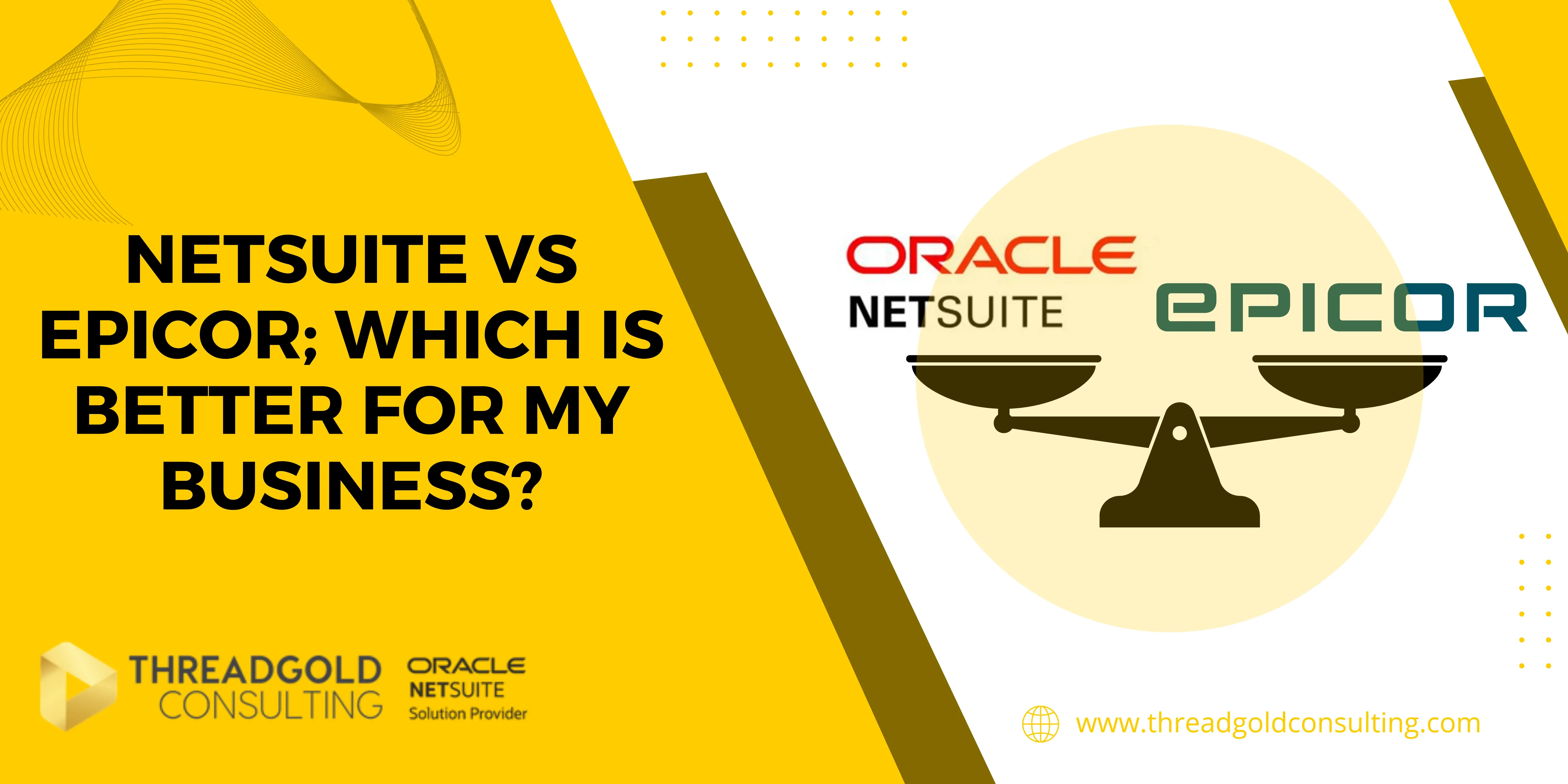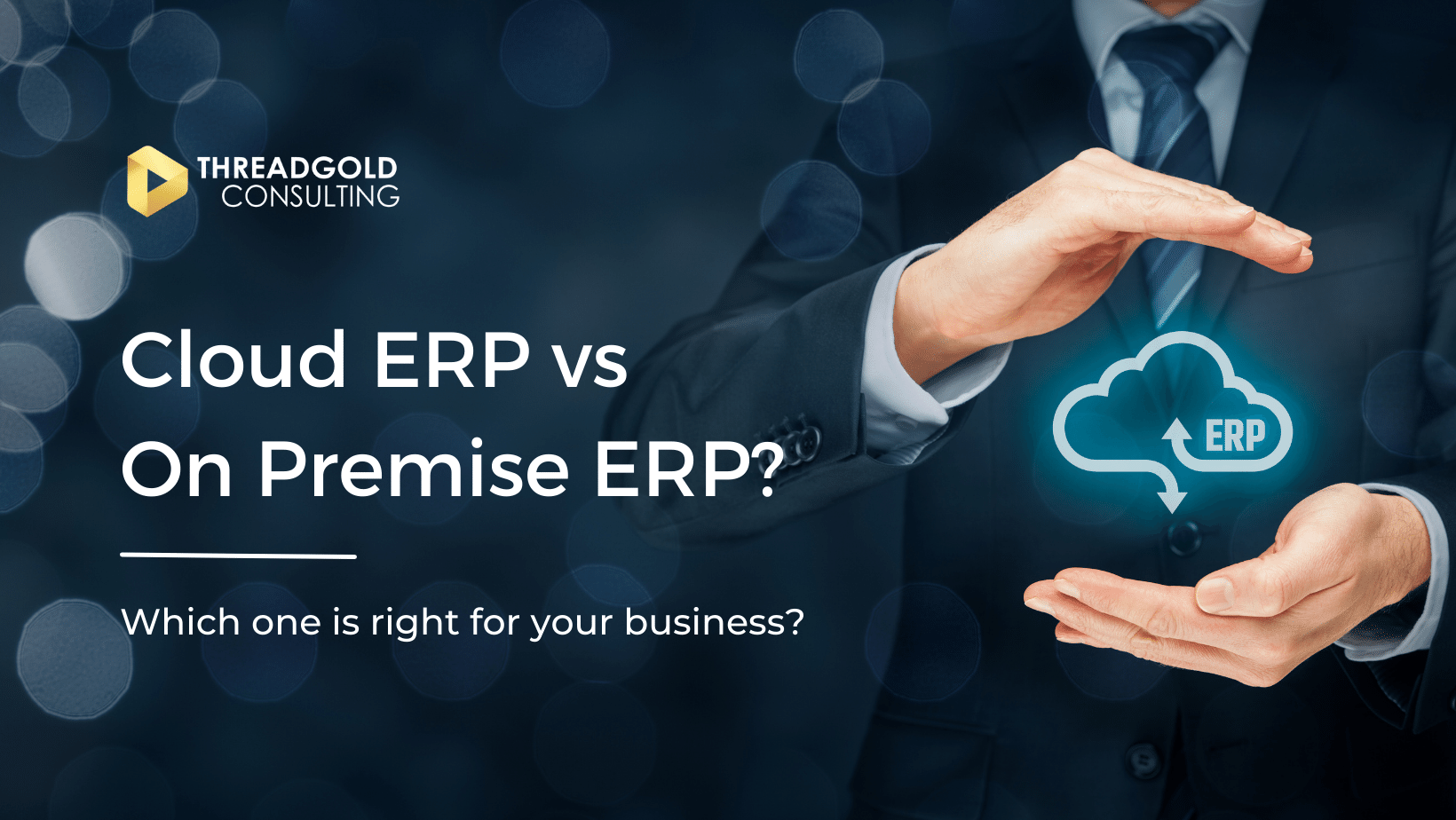If your company is considering implementing an ERP solution, choosing between the dozens of options can feel overwhelming. It's critically important to get the right solution that fits your business. To make the job of comparing easier for you, we have outlined below the similarities and differences between NetSuite and Epicor.
Overview of NetSuite
What is NetSuite?
NetSuite is a cloud-first ERP platform developed by Oracle. It brings together a wide range of business processes into one integrated system, helping companies eliminate silos, reduce manual work, and gain real-time visibility across departments. From accounting to order management, customer relationship management to e-commerce, everything is accessible in a single platform.
Key Features
NetSuite’s modular structure gives businesses the flexibility to pay only for the features they use, which makes it scalable for both growing startups and global enterprises. Its core features include:
- Financial management: Multi-currency, multi-entity consolidation allows global businesses to operate seamlessly across borders, simplifying compliance and reporting.
- Inventory and order management: Enables real-time inventory tracking and automated reordering, reducing stockouts and improving fulfillment accuracy.
- CRM and marketing automation: Combines customer data with marketing tools, making it easier to run targeted campaigns and track ROI.
- Project accounting: Especially useful for service-based businesses needing time and expense tracking, billing automation, and margin analysis.
- Custom dashboards and real-time reporting: Allow teams to monitor KPIs live, make quicker decisions, and adjust operations proactively.
The SuiteCloud platform also supports extensive customization and third-party integrations, ensuring the system adapts to how your business works, not the other way around.
Ideal Industries
NetSuite is designed to support a wide range of sectors, but it performs especially well in:
- SaaS and tech firms: Built-in subscription billing and recurring revenue recognition simplify complex financial operations.
- E-commerce and retail: Unified order and customer management across online, mobile, and in-store channels delivers consistent shopping experiences.
- Manufacturers and distributors: Offers visibility from raw material sourcing to finished goods delivery, improving supply chain coordination.
- Professional services: Tracks billable hours, project timelines, and budgets, all in one place.
Overview of Epicor
What is Epicor?
Epicor is an ERP provider known for its industry-specific solutions, particularly in manufacturing and distribution. Unlike NetSuite, it offers both cloud and on-premise options, which can be useful for companies with strict data control requirements or legacy infrastructure.
Key Features
Epicor’s depth in manufacturing and production planning makes it a compelling choice for companies with complex operational needs. Key features include:
- Advanced inventory and supply chain control: Supports real-time updates from the shop floor, including barcode scanning, kitting, and serial tracking.
- Production planning and MES: Helps manufacturers plan efficiently with tools for scheduling, resource planning, and execution monitoring.
- Financial management: Includes job costing, multi-currency support, and built-in compliance tools that cater to industry-specific accounting needs.
- CRM and field service: Provides tools to manage customer interactions, support tickets, and field technician schedules, which is beneficial for service-driven companies.
- Industry reporting templates: Saves time with built-in reports tailored to sector-specific KPIs and compliance regulations.
Ideal Industries
Epicor’s strength lies in its alignment with industrial operations. It’s best suited for:
- Discrete and process manufacturers: Where managing bill of materials (BOMs), work orders, and compliance is essential.
- Automotive and aerospace suppliers: These sectors benefit from Epicor’s traceability, regulatory support, and supplier quality controls.
- Building materials and fabricated metals: Epicor handles heavy inventory, large batch production, and variable product configurations with ease.
- Industrial machinery and electronics: Especially useful for companies needing support for engineered-to-order products or long production cycles.
Feature-by-Feature Comparison
Financial Management
NetSuite stands out with its global financial management capabilities. It handles multiple subsidiaries, currencies, and tax jurisdictions natively. This is particularly useful for companies expanding internationally, as it avoids the need for bolt-on solutions or manual consolidations.
Epicor, while not as strong in multi-entity management, excels in manufacturing-specific financial features. Its ability to track job costing at a granular level helps manufacturers understand profitability per job or product line—something NetSuite handles less natively.
Inventory & Supply Chain
NetSuite’s inventory system is highly customizable, integrating with fulfillment partners, POS systems, and e-commerce platforms. Its real-time dashboards make it easier to optimize stock levels, forecast demand, and avoid backorders.
Epicor, by contrast, is better suited for environments with advanced logistics requirements. It includes tools like dynamic routing, demand-driven MRP, and vendor-managed inventory out of the box. This makes it ideal for manufacturers that depend on tight production timelines and supply chain precision.
CRM & Marketing Tools
NetSuite provides a full CRM suite with marketing automation, sales forecasting, and partner relationship management. This unified system eliminates the need for external CRMs, simplifying data flow and customer visibility.
Epicor’s CRM is functional but more limited. It focuses on account management and sales pipelines but lacks the depth in email marketing and campaign tracking that NetSuite offers. Most companies using Epicor pair it with external platforms like HubSpot or Salesforce to close the gap.
Reporting & Analytics
NetSuite’s SuiteAnalytics is a strong feature, allowing teams to build custom reports without coding. Finance, operations, and sales can each monitor live KPIs and pivot based on performance in near real time.
Epicor includes a library of reports specific to industries like manufacturing and distribution, but building custom analytics often requires help from IT or third-party tools like Power BI. This can slow decision-making and increase dependency on technical staff.
Customisation & Integration
NetSuite’s SuiteScript and SuiteFlow tools give non-developers the ability to automate workflows and extend functionality. Its APIs are also widely supported by third-party apps, reducing the friction of integrating with platforms like Shopify, Stripe, or Salesforce.
Epicor’s ICE framework is highly configurable, with BAQs and REST APIs allowing deep system personalization. However, this often requires developer support, and customizations can become complex and time-consuming to manage.
Pricing & Deployment
NetSuite Pricing Model
NetSuite uses a subscription pricing model based on users, features, and modules. This modularity allows businesses to start small and expand over time. However, because pricing is quote-based, it can be hard to predict without a detailed consultation.
Implementation fees are typically significant, especially for businesses needing multiple modules or integrations. Still, NetSuite’s rapid time-to-value and upgrade path can justify the investment if you’re planning for long-term scalability.
If you'd like a more more detailed information, check out our NetSuite pricing blog. Or, use our pricing calculator below and a personalised quote for your business!
Epicor Pricing Model
Epicor offers both subscription and perpetual licensing. The cost can vary widely based on deployment model, industry package, and user roles. Perpetual licensing requires upfront capital but can save money over time for companies planning to use the same system for a decade or more.
Subscription pricing is more common for cloud customers and better suited for businesses that want predictable costs and less infrastructure to manage.
On-Premise vs Cloud Deployment
NetSuite is a true cloud system; there’s no hardware to maintain, and updates are automatically applied. This minimises IT overhead and ensures you’re always on the latest version.
Epicor offers both cloud and on-premise deployments. This flexibility benefits companies in heavily regulated industries or those with existing server infrastructure. However, the on-premise option requires internal IT support and longer upgrade cycles.
Usability and User Experience
User Interface
NetSuite’s modern UI is accessible via any browser, with mobile responsiveness built in. Dashboards are role-specific and help users quickly find what matters most to them, reducing time spent navigating the system.
Epicor’s Kinetic interface has improved its look and usability, but older versions still feel dated. Some users find the interface cluttered or inconsistent, particularly when transitioning between modules.
Implementation & Training
NetSuite’s SuiteSuccess methodology offers pre-built implementation templates for different industries, significantly reducing time to go-live. This benefits businesses looking for a predictable timeline and lower upfront workload.
Epicor’s implementations are more tailored and often more extensive. While this results in a highly customized solution, it also means longer project timelines and higher resource involvement from your internal teams.
Mobile Access
NetSuite offers full-featured mobile apps that allow users to approve workflows, view dashboards, and manage tasks remotely. This is essential for modern, hybrid teams that need flexibility.
Epicor’s mobile support is more fragmented. Some modules work well on mobile, especially field service, but others lack full functionality. This can be a limitation for teams needing full access from outside the office.
Support & Customer Service
Technical Support
NetSuite includes standard support with licensing but offers premium tiers for businesses needing 24/7 coverage. Many users choose to work with solution partners who can provide faster and more personalised assistance.
Epicor also offers tiered support packages. However, support quality can vary by deployment type, and companies using older or on-premise versions may face delays.
Community & Resources
NetSuite boasts a large global user community, along with a vast knowledge base (SuiteAnswers), training programs, and certified consultants. This makes it easier to find solutions and best practices without always relying on Oracle.
Epicor’s community is smaller but tightly knit. It includes user groups, the Epicor Learning Center, and access to EpicCare for technical support. However, fewer third-party consultants can limit your options when seeking external help.
Customer Reviews
Users praise NetSuite for its ability to scale and centralise operations across departments and locations. Complaints are mostly about high setup costs and occasional difficulties with initial configuration. Check out some reviews from real customers below:


Epicor users highlight the platform’s strength in manufacturing and production planning. However, many note the steeper learning curve and outdated interface elements in older versions. It also requires users to reimplement their customisations with every update, and this can cause big headaches as mentioned by a reviewer below.

Pros and Cons
NetSuite Pros and Cons
Pros:
- Designed for scalability, allowing you to start with basics and expand functionality over time.
- Strong CRM and marketing capabilities reduce the need for third-party tools.
- Global financial features make it easier to manage multi-country operations.
- Frequent updates ensure continued platform innovation.
Cons:
- Setup and customization costs can be high.
- Requires experienced partners or consultants for complex implementations.
- Some industries may need additional modules to meet specialized needs.
Epicor Pros and Cons
Pros:
- Tailored functionality for manufacturers and industrial companies.
- Deep customization through BAQs and scripting.
- Choice between on-premise and cloud gives more control over data.
Cons:
- User interface can be inconsistent or dated.
- Longer implementation times and more complex training.
- CRM and marketing features are basic.
Which ERP is Right for Your Business?
Small to Midsize Business (SMB) Needs
For SMBs, NetSuite offers a clear path to growth. Its modular structure, fast implementation with SuiteSuccess, and strong partner network make it accessible without overwhelming internal teams.
Epicor can still be a good fit for SMBs in manufacturing or wholesale, where specific production workflows are a top priority. However, the complexity of the system may require more time and support.
Large Enterprise Considerations
NetSuite supports large enterprises with its advanced compliance, audit trails, and multi-subsidiary consolidation. These features reduce the cost and time associated with closing books and managing international operations.
Epicor suits enterprises that need heavy customization or on-premise control, especially if they operate in sectors with stringent process or regulatory requirements.
Industry-Specific Scenarios
Use NetSuite if:
- You operate in a high-growth industry such as SaaS, retail, or e-commerce
- You need quick deployment and real-time visibility across business units
Use Epicor if:
- You manufacture complex products with strict quality or tracking needs
- You want to maintain tight control over shop floor processes and resource planning
Additional Tools and Insights
AI and Machine Learning Capabilities
NetSuite includes built-in AI tools like transaction anomaly detection, smart cash flow forecasts, and predictive analytics. These features help finance teams spot issues early and make more accurate projections.
Epicor’s EVA (Epicor Virtual Agent) is newer but adds functionality like natural language search, contextual recommendations, and machine learning for demand forecasting. Its capabilities continue to evolve with newer releases.
Update Cycles and Product Roadmap
NetSuite runs two major updates per year and maintains consistent versioning across all customers. This reduces the complexity of planning upgrades and ensures access to the latest features.
Epicor cloud customers benefit from frequent updates, but as mentioned earlier, on-premise users must manage upgrades independently. This can result in version disparities across departments.
Implementation Duration and ROI
- NetSuite average time to go-live: 100–180 days
- Epicor average time to go-live: 180–360 days
NetSuite typically offers ROI within 18–24 months due to faster go-live and lower IT maintenance. Epicor's ROI ranges from 24–36 months, influenced by the complexity of manufacturing requirements and longer deployment timelines.
NetSuite vs Epicor: Feature Comparison Table
| Feature | NetSuite | Epicor |
|---|---|---|
| Deployment Type | Cloud-only | Cloud & On-Premise |
| Financial Management | Advanced, Multi-Entity | Deep Job Costing |
| Inventory Management | Modular | Built-in, Industry-Specific |
| CRM & Marketing | Strong CRM + Integrations | Limited Marketing Capabilities |
| Customization | SuiteScript & SuiteFlow | BAQ & REST APIs |
| Mobile Access | Full App Support | Varies by Module |
| Reporting | SuiteAnalytics + Real-Time Dash | BI Tools (Power BI Recommended) |
| Support Options | Tiered + Solution Partners | Tiered + Learning Center |
| AI/ML Capabilities | Built-in Financial AI Tools | EVA Chatbot and ML Forecasts |
| Average ROI Timeline | 18–24 Months | 24–36 Months |
When choosing between NetSuite and Epicor, the right decision depends on your industry, internal capabilities, and long-term goals. Whichever you choose, make sure the system is flexible enough to grow with your business, not just serve it today.
Why Partner with Threadgold Consulting
Threadgold Consulting is the leading Global Oracle NetSuite partner. Our company has deep roots in NetSuite ERP and offers our customers ensured success through a proven implementation methodology.
We also offer innovative proprietary solutions and integrations using 3rd party tools to fill any gaps in the NetSuite ecosystem.
We are a certified NetSuite NetSuite Solution Provider partner offering licensing and implementation, consulting, development, strategic business planning, and 24/7 support.
Contact us today to find out how we can help your business grow.







-1.webp)